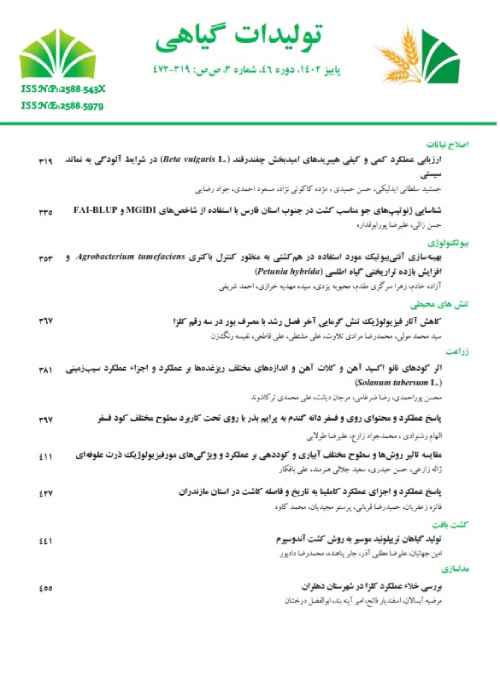Investigating the Effects of Plant Density, Seed Inoculation with Bacteria and Different Nitrogen Fertilizing Methods on Yield, Yield Components and Essential Oil of Fennel (Foeniculum vulgare Mill.)
Abstract:
Background And Objectives
Fennel is one the most important medicinal and aromatic plants which is widely used in food, medicine and cosmetic industries worldwide. This study was carried out in order to investigate the effects of different nitrogen nutritional systems including chemical, organic and biologic ones at different plant densities on yield, yield components and seed essential oil content and yield of fennel in south western Iran climatic conditions.Materials And Methods
To do this research, a field experiment was carried out in 2013-2014 agricultural season at Islamic Azad University of Shoushtar agricultural college in split plot design with 18 treatments in 4 replications based on completely randomized blocks design. Different nitrogen system treatments consisting of N1: Uniformly spreading urea fertilizer in the plot, half at planting time and other at stem elongation, N2: Uniformly spreading half of urea fertilizer in the plot at planting time and spraying the other half at stem elongation on fennel foliage, N3: cow manure, N4: Inoculation of fennel seeds with Azotobacter and Azospirillum, N5: Applying half of required nitrogen fertilizer from cow manure and other half from urea, N6: Applying half of required nitrogen fertilizer from cow manure inoculation of fennel seeds with Azotobacter and Azospirillum were applied to the main plots. Three fennel densities consisting of FD1: 60 plant/m2, FD2: 80 plant/m2 and FD3: 100 plant/m2 were applied to subplots.Results
Based on the results, utilization of the first integrated treatment which consisted of cow manure and urea as chemical fertilizer at 50:50 percent, along with using 100 plant per m2 as a proper crop density achieved production of 94.575 g/m2 seed yield containing 3.375 percent of essential oil. Other findings showed that Azotobacter Azospirillum had no positive effect on plant seed yield and essential oil.Discussions
The findings of our study showed that replacing 50 percent of required nitrogen with cow manure in fennel could lead to a favorable quantitative and qualitative seed production as well as the treatments which use 100 percent of nitrogen as chemical fertilizers. It seems that nitrogen application with manure probably through increasing organic matter mineralization and mineral absorption, improved the effectiveness of manure. Therefore application of such a combination not only could lead to a desirable fennel quantity and quality, but also is more consistent with environment. Other findings of the present study showed that seed inoculation with bio-fertilizers (Azotobacter Azospirillum) had no positive effects on plant seed yield and essential oil. For such a result, it could be said that climate and soil conditions and also plant species and varieties are important in bio-fertilizers usefulness and also in determining suitable bacteria species for application. Keywords:
Language:
Persian
Published:
Plant Production, Volume:40 Issue: 1, 2017
Pages:
111 to 121
magiran.com/p1676259
دانلود و مطالعه متن این مقاله با یکی از روشهای زیر امکان پذیر است:
اشتراک شخصی
با عضویت و پرداخت آنلاین حق اشتراک یکساله به مبلغ 1,390,000ريال میتوانید 70 عنوان مطلب دانلود کنید!
اشتراک سازمانی
به کتابخانه دانشگاه یا محل کار خود پیشنهاد کنید تا اشتراک سازمانی این پایگاه را برای دسترسی نامحدود همه کاربران به متن مطالب تهیه نمایند!
توجه!
- حق عضویت دریافتی صرف حمایت از نشریات عضو و نگهداری، تکمیل و توسعه مگیران میشود.
- پرداخت حق اشتراک و دانلود مقالات اجازه بازنشر آن در سایر رسانههای چاپی و دیجیتال را به کاربر نمیدهد.
In order to view content subscription is required
Personal subscription
Subscribe magiran.com for 70 € euros via PayPal and download 70 articles during a year.
Organization subscription
Please contact us to subscribe your university or library for unlimited access!


